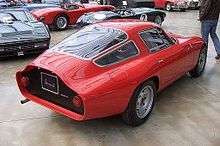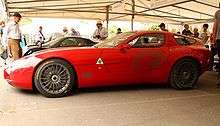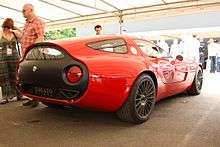Alfa Romeo Giulia TZ
| Alfa Romeo Giulia TZ | |
|---|---|
.jpg) 1963 Alfa Romeo Giulia TZ | |
| Overview | |
| Manufacturer | Alfa Romeo |
| Also called | Alfa Romeo TZ |
| Production | 1963–1967 |
| Designer | Ercole Spada[1] at Zagato (TZ1 and TZ2) |
| Body and chassis | |
| Class |
Sports car Racing car |
| Body style | 2-door coupé |
| Layout | Front-engine, rear-wheel-drive |
| Powertrain | |
| Engine | 1.6 L DOHC I4 |
| Transmission | 5-speed manual |
| Dimensions | |
| Wheelbase | 2,200 mm (86.6 in) |
| Length |
3,950 mm (155.5 in) TZ 3,680 mm (144.9 in) TZ2 |
| Width |
1,509 mm (59.4 in) TZ 1,600 mm (63.0 in) TZ2 |
| Height |
1,199 mm (47.2 in) TZ 1,020 mm (40.2 in) TZ2 |
| Curb weight |
660 kg (1,460 lb) (TZ) 620 kg (1,370 lb) (TZ2) |
| Chronology | |
| Predecessor | Alfa Romeo Giulietta SZ |
| Successor |
Alfa Romeo GTA Alfa Romeo Tipo 33 |
The Alfa Romeo Giulia TZ (also known as the Alfa Romeo TZ or Tubolare Zagato) was a sports car and racing car manufactured by Alfa Romeo from 1963 to 1967. It replaced the Giulietta SZ.
Giulia TZ

The original TZ, currently sometimes referenced as TZ1 to differ from later TZ2, was developed in together with Autodelta, a company led by Ex-Ferrari engineer Carlo Chiti. It featured a 1,570 cc twin cam engine and other mechanical components shared with the Alfa Romeo Giulia and carried a 105 series chassis number,[2] but was a purpose built sports racing car, with a tubular spaceframe chassis, light all-aluminium bodywork, disc brakes and independent suspension. The result was a lightweight coupé of only 650 kilograms (1,430 lb)[3] and top speed of 134 miles per hour (216 km/h). The TZ was built both for street and racing trim, with the latest racing versions producing up to 160 brake horsepower (120 kW). Alfa's twin-spark cylinder head, as also used in the GTA, contributed to the speed of the TZ; the standard Giulia alloy block with wet steel liners was installed at an angle under the hood of the TZ to improve airflow.
Aiding the TZ in its quest for performance was the treatment of the rear bodywork. Incorporating the research of Dr. Wunibald Kamm, the TZ used a style called "coda tronca" in Italian, meaning "short tail.", otherwise known as the Kamm tail. The principle is that unless you are willing to incorporate an aircraft-like extended tail (not practical for an automobile), there is surprisingly little, if any, increase in drag and a marked decrease in lift or even some downforce by simply chopping off a portion of the tail. Zagato had previously proved the success of this tail treatment in their "coda tronca" Sprint Zagato sports-racing cars, and it was a natural evolution to adapt this to the Giulia TZ.
The car debuted at the 1963 FISA Monza Cup, where TZs took the first four places in the prototype category. At the beginning of 1964 the TZ was homologated (100 units were needed for homologation) to the Gran Turismo category.[4] After homologation it started to take more class wins in Europe and North-America. Of the first TZ, 112 units were built between 1963 and 1965. Only built as limited amount these TZ models are quite collectibles nowadays, listed price around 150,000-200,000 US dollars.[5]
Engine
- 1,570 cc straight-4 DOHC 112 bhp (82 kW) at 6500 rpm (road trim), 160 bhp (118 kW) (race trim)
Giulia TZ2

In 1965 the car was updated with new fibreglass bodywork providing lower drag and reduced weight (620 kg). This new version was also made by Zagato. The new design was called the Alfa Romeo Giulia TZ2. The TZ2 was only built as racing version; it was equipped with an Autodelta-prepared twin plug, dry sump lubrication 1,570 cc straight-4 DOHC engine producing around 170 brake horsepower (130 kW) at 7000 rpm. With this engine the car reached top speed of 152 miles per hour (245 km/h).[6] The rear window was also changed, now single unit rather than three part window in TZ. Development of TZ cars was stopped in the end of 1965, to make room for new GTA racing program. Only 12 TZ2s were built. [7]
The car won the prestigious Gran Turismo Trophy at the 2009 Pebble Beach Concours d'Elegance.
TZ3
Zagato TZ3 Corsa


To celebrate Alfa's 100 years, Zagato designed a one-off car that was first presented at, and won, the 2010 Concorso d'Eleganza Villa d'Este in Italy. This unique car, based on the Alfa Romeo 8C Competizione, was made for German collector Martin Kapp and is not intended for sale or for competitions.
The car weighs 850 kg (1,874 lb) thanks to its carbon fiber frame and hand beaten aluminium body and has 420 hp (313 kW) dry sump V8 4.2 litre engine. The car has a 6-speed sequential gearbox, it reaches a top speed of over 300 km/h (186 mph) and it can accelerate from zero to 100 km/h (62 mph) in 3.5 seconds.[8]
Zagato TZ3 Stradale

On April 28, 2011 Zagato unveiled a road-going version of the TZ3 based on the Dodge Viper ACR-X. Dubbed the Alfa Romeo TZ3 Stradale, it is powered by the Viper's 8.4 liter 640 hp (477 kW) V10.[9] Only nine units have been made.[10] The TZ3 Stradale was designed by Norihiko Harada.
See also
Notes
- ↑ Chris Koopmann. "Ercole Spada". zagato-cars.com. Retrieved 2012-05-24.
- ↑ "Alfa Romeo Model Identification". international-auto.com. Archived from the original on 27 September 2007. Retrieved 2007-09-05.
- ↑ David Owen, Great Marques Alfa Romeo, P62. "650 kg (1430 lb) ready for the track"
- ↑ "Autodelta - a history". italiancar.net. Retrieved 2007-09-05.
- ↑ "1965 Alfa Romeo Giulia TZ". sportscarmarket.com. Archived from the original on 22 September 2007. Retrieved 2007-09-05.
- ↑ "Alfa Romeo Giulia TZ". autozine.org. Archived from the original on 2007-09-26. Retrieved 2007-09-05.
- ↑ "Alfa Romeo Giulia TZ". carsfromitaly.net. Archived from the original on 27 September 2007. Retrieved 2007-09-05.
- ↑ "TZ3 CORSA Specification Sheet" (PDF). zagato.it. 2010. Archived (PDF) from the original on 1 June 2010. Retrieved 2010-07-02.
- ↑ Pfannmueller, Matthias (August 2011). "Zagato Alfa Romeo TZ3 Stradale". Road & Track. 62 (12): 16–17. Retrieved April 10, 2012.
- ↑ "Official: Zagato unveils new TZ3 Stradale with the heart of a Viper and the soul of an Alfa". autoblog.com. 2011. Retrieved 2011-04-28.
References
| Wikimedia Commons has media related to |
- Owen, David (1985). Great Marques Alfa Romeo. Octopus Bks. ISBN 0-7064-2219-8.
- Alfa Romeo Guides on QV500.com
| « previous — Alfa Romeo car timeline, 1950s–1970s — next » | ||||||||||||||||||||||||||||||||
|---|---|---|---|---|---|---|---|---|---|---|---|---|---|---|---|---|---|---|---|---|---|---|---|---|---|---|---|---|---|---|---|---|
| Type | 1950s | 1960s | 1970s | |||||||||||||||||||||||||||||
| 0 | 1 | 2 | 3 | 4 | 5 | 6 | 7 | 8 | 9 | 0 | 1 | 2 | 3 | 4 | 5 | 6 | 7 | 8 | 9 | 0 | 1 | 2 | 3 | 4 | 5 | 6 | 7 | 8 | 9 | |||
| Small family car | Dauphine | Alfasud | ||||||||||||||||||||||||||||||
| Compact executive car | Giulietta (750/101) | |||||||||||||||||||||||||||||||
| Giulia | Giulietta (116) | |||||||||||||||||||||||||||||||
| Executive car | 1750 Berlina | Alfetta | ||||||||||||||||||||||||||||||
| 2000 Berlina | Alfetta 2000 | |||||||||||||||||||||||||||||||
| 1900 | 2000 | 2600 | Alfa 6 | |||||||||||||||||||||||||||||
| Coupé | Giulietta Sprint | GT Junior | Alfasud Sprint | |||||||||||||||||||||||||||||
| Giulia Sprint GT/GT Veloce | Alfetta GT and GTV | |||||||||||||||||||||||||||||||
| 1900 Sprint | 2000 Sprint | 2600 Sprint | ||||||||||||||||||||||||||||||
| Cabriolet | 1900 L | Giulia GTC | ||||||||||||||||||||||||||||||
| Spider | Giulietta Spider | Spider | ||||||||||||||||||||||||||||||
| 2000 Spider | 2600 Spider | |||||||||||||||||||||||||||||||
| Roadster | Gran Sport Quattroruote | |||||||||||||||||||||||||||||||
| Sports car | 6C 2500 | Montreal | ||||||||||||||||||||||||||||||
| 33 Stradale | ||||||||||||||||||||||||||||||||
| Racing car | TZ | GTA | ||||||||||||||||||||||||||||||
| 158/159 | Tipo 33 | 177/ 179 | ||||||||||||||||||||||||||||||
| Off-road | Matta | |||||||||||||||||||||||||||||||
| LCV | Romeo | Romeo 2 | Romeo 3 | F11/F12/A11/A12 | ||||||||||||||||||||||||||||
| AR8 | ||||||||||||||||||||||||||||||||
